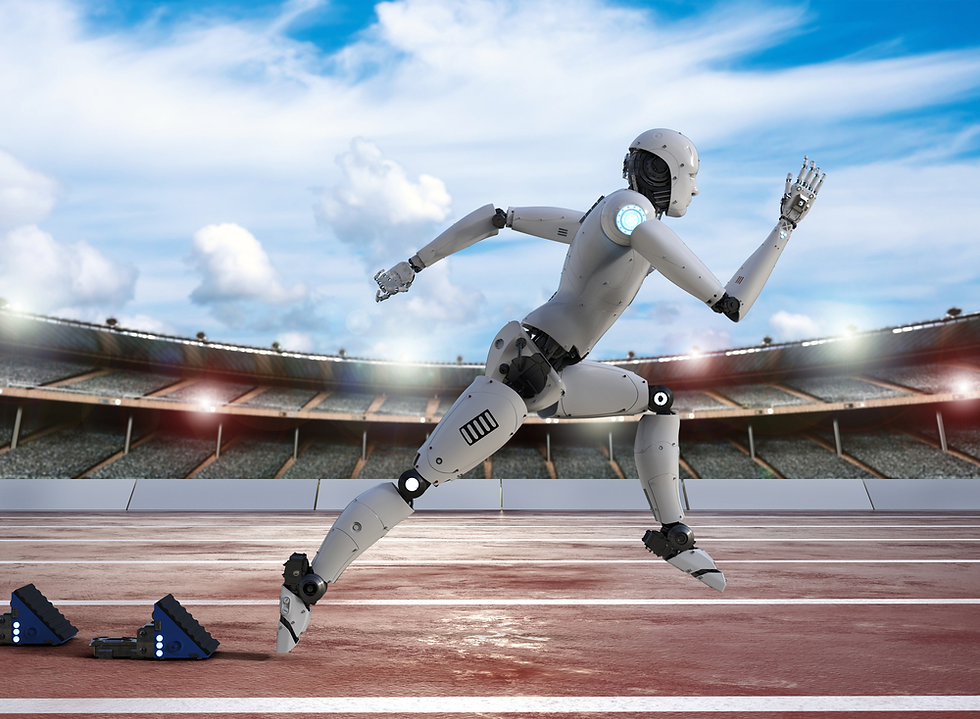The Intersection of AI and Sports Law: Exploring Legal Issues in Officiating and Player Performance Analysis
- May 18, 2024
- 7 min read
Written by Mani Balaji
Introduction:
The world of sports is undergoing a technological revolution, with artificial intelligence (AI) rapidly becoming an integral part of the athletic ecosystem. From officiating decisions to player performance analysis, AI is poised to transform how sports are played, watched, and managed. However, this transformation has many legal implications that must be carefully navigated to ensure fairness, transparency, and the protection of all stakeholders involved.
As AI systems evolve and become more sophisticated, their potential applications in the sports industry are vast and far-reaching. Yet, with these opportunities come significant legal challenges that demand attention from sports organizations, technology providers, legal experts, and policymakers alike.
This article explores the legal landscape surrounding the intersection of AI and sports law, focusing on officiating and player performance analysis. It delves into the key legal issues that arise from the increasing use of AI in these domains and provides insights into the potential legal frameworks and safeguards that need to be established.
AI in Officiating: Balancing Accuracy and Accountability
One of the most visible applications of AI in sports is its use in officiating decisions. From line calls in tennis to video review systems in various sports, AI-powered technologies are being employed to enhance the accuracy and consistency of officiating. However, this trend raises critical legal questions about fairness, transparency, and accountability.
The reliability and potential biases of AI algorithms used for officiating decisions are a significant concern. While these systems are designed to minimize human error and subjectivity, they are not immune to flaws and biases inherent in their training data or algorithms. This raises the question of how legal systems should approach the delegation of officiating decisions to AI systems and the potential liability issues that may arise.
Moreover, the need for more transparency surrounding AI decision-making processes can be problematic from a legal perspective. Opaque "black box" algorithms make understanding the reasoning behind specific officiating decisions challenging, potentially undermining due process and the ability to effectively challenge or appeal such choices.
To address these concerns, legal frameworks and guidelines must be established to govern the use of AI in officiating. These may include:
1. Transparency and Explain ability Requirements: Mandating AI systems used for officiating to be transparent and explainable allows stakeholders to understand the decision-making process and the factors considered.
2. Independent Auditing and Oversight: Implementing mechanisms for independent auditing and oversight of AI officiating systems to ensure fairness, accuracy, and compliance with relevant laws and regulations.
3. Legal Recourse and Appeal Processes: Establishing transparent legal processes for challenging and appealing officiating decisions made by AI systems, including the ability to seek human review or intervention when necessary.
4. Liability Frameworks: Developing legal frameworks that define liability and accountability for errors or biases in AI officiating systems, potentially involving shared responsibility between technology providers and sports organizations.
AI in Player Performance Analysis: Data Privacy and Algorithmic Bias Concerns
Another area where AI is making significant inroads is player performance analysis. AI-driven systems can analyze vast amounts of data, including biometric information, video footage, and movement tracking, to provide insights into player performance, injury risk, and strategic decision-making.
While this technology holds immense potential for enhancing player development and team strategies, it raises critical legal concerns about data privacy and algorithmic bias.
Collecting and processing biometric and personal data for player performance analysis are subject to data protection laws and regulations, such as the General Data Protection Regulation (GDPR) in the European Union or equivalent regulations in other jurisdictions. These laws aim to protect individuals' privacy rights and impose strict requirements on data handling practices.
Sports organizations and technology providers must have appropriate legal bases and consent mechanisms for collecting, storing, and using player data. Failure to comply with data protection laws could result in significant fines and legal consequences.
Additionally, using AI systems for player evaluation and performance analysis raises concerns about algorithmic bias and potential discrimination. AI algorithms can inadvertently perpetuate or amplify existing biases based on race, gender, or other protected characteristics, leading to unfair treatment and unequal opportunities for players.
Legal frameworks and oversight mechanisms must be established to mitigate these risks and ensure AI's responsible and ethical use in player performance analysis. Some potential measures include:
1. Data Protection Compliance: Ensuring strict compliance with data protection laws and regulations, including implementing robust data security measures, transparency, and accountability mechanisms.
2. Algorithmic Auditing and Bias Testing: Mandating regular auditing and bias testing of AI systems used for player performance analysis to identify and mitigate potential biases or discriminatory outcomes.
3. Consent and Transparency Requirements: Implementing precise consent mechanisms and transparency requirements allows players to understand how their data is used and gives them meaningful control over their personal information.
4. Non-Discrimination Policies: Developing and enforcing non-discrimination policies prohibiting AI systems in ways that unfairly disadvantage or discriminate against players based on protected characteristics.
Governing AI in Sports: The Need for Comprehensive Frameworks
As the use of AI in sports continues to expand, it becomes increasingly evident that comprehensive legal and regulatory frameworks are necessary to govern its implementation and ensure the protection of all parties involved. This requires a concerted effort from policymakers, sports governing bodies, and technology providers to establish clear guidelines and standards.
One crucial aspect of these frameworks is the need for robust oversight and monitoring mechanisms. Independent auditing and regulatory bodies should be empowered to scrutinize the development and deployment of AI systems in sports, ensuring compliance with established guidelines and identifying potential issues or biases.
Additionally, these frameworks should address the need for transparency and explainability in AI decision-making processes. Stakeholders, including athletes, coaches, and fans, should have access to clear explanations of how AI systems arrive at their decisions, enabling accountability and the ability to challenge or appeal decisions when necessary.
Furthermore, legal frameworks should establish clear lines of responsibility and liability for errors, biases, or adverse consequences of using AI in sports. This may involve shared liability between sports organizations, technology providers, and other relevant parties, ensuring that appropriate measures are in place to mitigate risks and provide recourse for those affected.
Intellectual Property and Contractual Implications
The development and deployment of AI technologies in sports also raise intellectual property (IP) and contractual considerations that must be addressed legally.
AI systems used for officiating or player performance analysis often involve proprietary algorithms, models, and datasets developed by technology companies or research institutions. This creates a complex web of IP rights, including patents, copyrights, and trade secrets, which must be navigated to avoid infringement issues and legal disputes.
Sports organizations and technology providers may need to establish licensing agreements, joint development partnerships, or other contractual arrangements to ensure proper IP protection and fair use of AI technologies.
Furthermore, using AI in player performance analysis and decision-making could have significant implications for player contracts and collective bargaining agreements. As AI-driven insights increasingly influence player evaluations, trades, and contract negotiations, legal frameworks must be established to ensure fairness and transparency.
Player unions and sports organizations may need to collaborate to develop guidelines and policies governing the use of AI in player-related decisions, including provisions for human oversight, appeal processes, and the protection of player rights and interests.
Conclusion: Charting a Path Towards Responsible AI in Sports
As the integration of AI in sports continues to accelerate, the legal challenges and implications must be addressed proactively and comprehensively. Failure to do so could result in a litany of legal disputes, infringements, and controversies that undermine the integrity and fairness of the sports industry. The path forward lies in fostering a collaborative and multi-stakeholder approach, bringing together sports organizations, technology providers, legal experts, policymakers, and other relevant entities to develop robust legal frameworks and guidelines. These frameworks should strike a delicate balance between promoting innovation and embracing the benefits of AI in sports while simultaneously safeguarding the rights and interests of all parties involved.
Transparency, accountability, and ethical principles must be at the forefront of these efforts, ensuring that AI systems used in officiating and player performance analysis are explainable, auditable, and free from inherent biases or discriminatory outcomes. Clear legal recourse and appeal processes should be established to allow for the fair and impartial resolution of disputes arising from AI-driven decisions.
Moreover, data privacy and intellectual property rights must be rigorously protected through stringent compliance with relevant laws and regulations and the implementation of robust consent mechanisms and licensing agreements. By prioritizing responsible innovation and proactively addressing the legal implications of AI in sports, the industry can capitalize on the transformative potential of these technologies while maintaining the highest standards of fairness, integrity, and ethical conduct.
Ultimately, the successful integration of AI in sports will require a sustained commitment from all stakeholders, a willingness to adapt and evolve as technologies advance, and a steadfast dedication to upholding the values and principles that have long been the bedrock of athletic competition. Only through this holistic and collaborative approach can the sports industry navigate the brave new world of AI while preserving the essence of sportsmanship, fair play, and the enduring spirit of athletic excellence.
*The Author is a legal Scholar from India
(The Image used here is for representative purposes only)
References:
Hammes F, Hagg A, Asteroth A, Link D. Artificial Intelligence in Elite Sports-A Narrative Review of Success Stories and Challenges. Front Sports Act Living. 2022 Jul 11;4:861466. doi: 10.3389/fspor.2022.861466. PMID: 35899138; PMCID: PMC9309390.
Solanki, A. (2024, March 11). AI and data analytics in sports: Use cases, benefits, and considerations. Softwebsolutions. https://www.softwebsolutions.com/resources/ai-data-analytics-use-cases-in-sports.html
Ferrer, Xavier & van Nuenen, Tom & Such, Jose & Cote, Mark & Criado, Natalia. (2021). Bias and Discrimination in AI: A Cross-Disciplinary Perspective. IEEE Technology and Society Magazine. 40. 72-80.
Av Content Team. (2024, February 27). How is AI Powering the Future of Sports? Analytics Vidhya. https://www.analyticsvidhya.com/blog/2023/05/how-is-ai-powering-the-future-of-sports/
Significance of intellectual property in the field of sports. (n.d.). https://www.globalpatentfiling.com/blog/Role-Of-Intellectual-Property-In-Sports-Industry#:~:text=Proper%20protection%20of%20the%20IP's,IP%20in%20sports%20in%20India
Team, E. S. (2023, December 28). AI in Sports: Changing the Game. ESS Global Training Solutions. https://esoftskills.com/ai-in-sports/





Comments